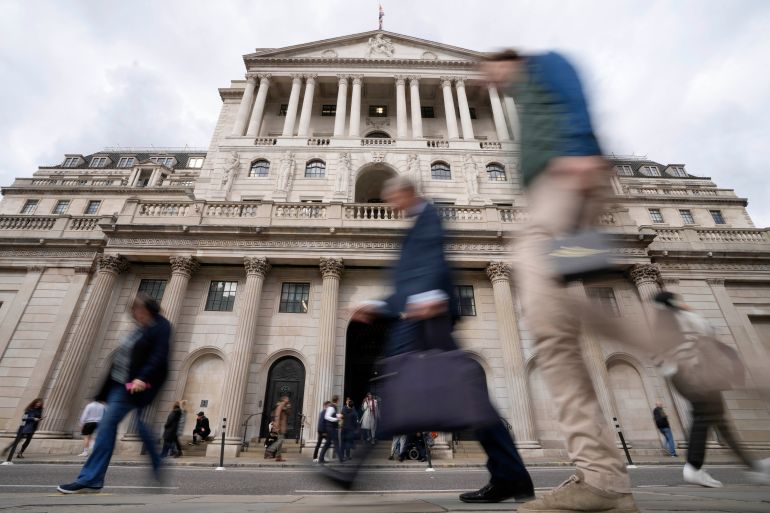Bank of England delivers biggest interest rate hike in 33 years
Central bank raises key rate to 3 percent, warns UK economy is in a recession that could last two years.

The United Kingdom’s central bank has warned that the country faces a long and painful recession after announcing its biggest interest rate hike in more than 30 years in a bid to fight soaring inflation.
The Bank of England’s (BoE) move on Thursday to boost its key rate to 3 percent, up from 2.25 percent, came after consumer price inflation returned to a 40-year high in September.
Keep reading
list of 4 itemsUK reports bleak economic data, pound slips amid political crisis
UK inflation jumps back above 10 percent as food prices soar
UK Treasury chief Jeremy Hunt reverses nearly all tax cut plans
It takes borrowing costs to their highest level since 2008 and marks the biggest interest rate rise since 1989.
The bank warned of a “very challenging” economic outlook ahead and forecast that inflation will hit a 40-year high of about 11 percent during the current quarter. In September, consumer price inflation stood at 10.1 percent.
The bank also said the UK economy has already entered a recession that could last two years – longer than during the 2008-09 financial crisis.
Bank warns rates set to rise further
Two policymakers, Silvana Tenreyro and Swati Dhingra, voted for smaller interest rate increases of 0.25 and 0.5 percentage points, respectively.
But the majority of the nine-member Monetary Policy Committee said rates would need to rise higher still, although probably not as high as the 5.2 percent that was priced into financial markets when the BoE finalised its forecasts.
“Further increases in bank rate might be required for a sustainable return of inflation to target, albeit to a peak lower than priced into financial markets,” the BoE said in unusually specific guidance to investors.
“The committee continues to judge that, if the outlook suggests more persistent inflationary pressures, it will respond forcefully, as necessary,” it added.
The interest rate decision is the first since former Prime Minister Liz Truss’s government announced 45 billion pounds ($50.2bn) of unfunded tax cuts that sparked turmoil in financial markets, pushed up mortgage costs and created a political crisis that forced her from office after just six weeks.
Her successor, Rishi Sunak, has warned of spending cuts and tax increases as he seeks to undo the damage and show that the UK is committed to paying its bills.
Eighth successive hike
The rate increase is the BoE’s eighth in a row and comes after the United States Federal Reserve on Wednesday announced a fourth consecutive three-quarter point jump as central banks worldwide combat inflation that is eroding living standards and slowing economic growth.
Jeremy Hunt, the UK’s finance minister, said after the BoE’s decision that getting inflation under control was the government’s top priority.
“Inflation is the enemy and is weighing heavily on families, pensioners and businesses across the country,” Hunt said.
“Interest rates are rising across the world as countries manage rising prices largely driven by the COVID-19 pandemic and [Russian President Vladimir] Putin’s invasion of Ukraine,” he added.
“The most important thing the British government can do right now is to restore stability, sort out our public finances, and get debt falling so that interest rate rises are kept as low as possible.”
Al Jazeera’s Charlie Angela, reporting from London, said the UK government and BoE will hope the interest rate hike “will suck some demand out of the economy and encourage people to save rather than spend or borrow and eventually push prices down”.
“But the problem is, that here in Britain, it’s not just inflation that is putting pressure on the economy but it is also supply chain problems and energy costs … so there is only so much that the bank can do,” Angela said.